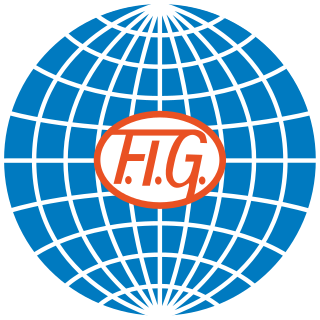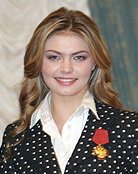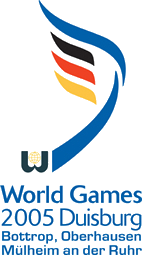
Rhythmic gymnastics is a sport in which gymnasts perform individually or in groups on a floor with an apparatus: hoop, ball, clubs, ribbon and rope. The sport combines elements of gymnastics, dance and calisthenics; gymnasts must be strong, flexible, agile, dexterous and coordinated. Rhythmic gymnastics is governed by the International Gymnastics Federation (FIG), which first recognized it as a sport in 1963. At the international level, rhythmic gymnastics is a women-only sport.
At the 2004 Summer Olympics in Athens, Greece, three disciplines of gymnastics were contested: artistic gymnastics, rhythmic gymnastics and trampoline. The artistic gymnastics and trampoline events were held at the Olympic Indoor Hall and the rhythmic gymnastics events were held at the Galatsi Olympic Hall.

The International Gymnastics Federation is the body governing competition in all disciplines of gymnastics. Its headquarters is in Lausanne, Switzerland. It was founded on 23 July 1881 in Liège, Belgium, making it the world's oldest existing international sports organisation. Originally called the European Federation of Gymnastics, it had three member countries—Belgium, France and the Netherlands—until 1921, when non-European countries were admitted and it received its current name.

Alina Maratovna Kabaeva or Kabayeva is a Russian politician, media manager and retired individual rhythmic gymnast, who has been designated Honoured Master of Sports by the Russian government.

The 2005 World Games, the seventh World Games, were an international multi-sport event held in Duisburg, Germany from 14 July 2005 until 24 July 2005. Three other cities, namely Bottrop, Mülheim an der Ruhr, and Oberhausen, also held some of the competition events. More than 3,000 athletes competed in 31 official sports and 6 invitational sports.
Gymnastics World Championships refers to a number of different world championships for each of the disciplines in competitive gymnastics. The International Gymnastics Federation (FIG) organizes World Championships for six disciplines: acrobatic gymnastics, aerobic gymnastics, artistic gymnastics, parkour, rhythmic gymnastics, as well as trampoline and tumbling. The International Federation of Aesthetic Group Gymnastics (IFAGG) organizes World Championships for the sport of aesthetic group gymnastics.

At the 2008 Summer Olympics, three gymnastics disciplines were contested: artistic gymnastics, rhythmic gymnastics and trampoline. The artistic gymnastics events were held at the Beijing National Indoor Stadium on August 9–19. The rhythmic gymnastics events were held at the Beijing University of Technology Gymnasium on August 21–24. The trampoline events were also held at the Beijing National Indoor Stadium on August 16–19.
The Rhythmic Gymnastics World Championships are the world championships for the sport of rhythmic gymnastics. The tournament is promoted and organized by the Fédération Internationale de Gymnastique (FIG). It is one of the three tournaments in rhythmic gymnastics officially organized by FIG, as well as the Rhythmic Gymnastics World Cup and the gymnastics competitions at the Olympic Games. The first edition of the World Championships was held in 1963, a time when the sport was known as modern gymnastics. The current program of the World Championships contemplates both individual and group performances. In even non-Olympic years and the year before the Olympics, a team event is also contested. Two events are not competed at the World Championships anymore: individual rope and free hands.

Ayiesha Naazmi Johnston is an Australian rhythmic gymnast who represented Australia at the 2008 Summer Olympics as well as the 2006 Commonwealth Games. She competed at world championships, including at the 2005 World Rhythmic Gymnastics Championships, 2009 World Rhythmic Gymnastics Championships and 2010 World Rhythmic Gymnastics Championships.
The Rhythmic Gymnastics World Cup is a competition for rhythmic gymnastics sanctioned by the Fédération Internationale de Gymnastique (FIG). It is one of the few tournaments in rhythmic gymnastics officially organized by FIG, as well as the World Championships, the gymnastics competitions at the Olympic Games and the Youth Olympics, and the rhythmic gymnastics events at the World Games. The World Cup series should not be confused with the Rhythmic Gymnastics Grand Prix series, which is neither officially organized nor promoted by FIG.

Gymnastics at the 2020 Summer Olympics in Tokyo was held in three categories: artistic gymnastics, rhythmic gymnastics and trampolining. All gymnastics events were staged at the Olympic Gymnastic Centre, Tokyo in 2021.
These are four lists of achievements in major international gymnastics events according to first-place, second-place and third-place results obtained by gymnasts representing different nations. The objective is not to create combined medal tables; the focus is on listing the best positions achieved by gymnasts in major international competitions, ranking the nations according to the most number of podiums accomplished by gymnasts of these nations. All seven competitive disciplines currently recognized by the International Gymnastics Federation (FIG) are covered: 1) acrobatic gymnastics, 2) aerobic gymnastics, 3) men's artistic gymnastics, 4) women's artistic gymnastics, 5) women's rhythmic gymnastics, 6) trampoline and tumbling, and 7) parkour.
FIG World Cup refers to a number of events organized by the International Gymnastics Federation (FIG) across seven competitive gymnastics disciplines: 1) acrobatic gymnastics, 2) aerobic gymnastics, 3) men's artistic gymnastics, 4) women's artistic gymnastics, 5) women's rhythmic gymnastics, 6) trampoline and tumbling, and 7) parkour.
The South American Gymnastics Confederation (CONSUGI) organizes South American Gymnastics Championships in different disciplines of gymnastics: men's and women's artistic gymnastics, rhythmic gymnastics, trampoline and tumbling, as well as aerobic gymnastics.
Rut Castillo Galindo is a Mexican individual rhythmic gymnast. She represented Mexico at the 2020 Summer Olympics and became the first Mexican rhythmic gymnast to compete at an Olympic Games. She is the 2021 Pan American all-around champion. At the 2007 Pan American Games, she won the silver medal in hoop and the bronze medals in the all-around and clubs. She is an eight-time Central American and Caribbean Games champion. She has also competed at nine World Championships.

The 2018 Rhythmic Gymnastics World Championships were held in Sofia, Bulgaria, from 10 to 16 September 2018 at Arena Armeec. The top three countries in the group all-around, Russia, Italy, and Bulgaria won the first three spots for the 2020 Olympic Games. Russia was the most successful nation of the competition with seven of the nine gold medals, and Bulgaria and Italy each won a title.

The 2019 Rhythmic Gymnastics World Championships were held in Baku, Azerbaijan from 16 to 22 September 2019. The competition took place at the National Gymnastics Arena and served as a qualifier for the 2020 Olympic Games. There were Olympic berths awarded to 16 individuals and 5 groups. There were 301 participating athletes from 61 countries.

The rhythmic gymnastics events at the 2001 World Games in Akita was played between 22 and 23 August. 24 rhythmic gymnastics competitors, from 16 nations, participated in the tournament. The rhythmic gymnastics competition took place at Akita City Gymnasium.
Gymnastics competitions at the 2024 Summer Olympics in Paris were contested in three categories: artistic gymnastics, rhythmic gymnastics and trampolining. The artistic and trampoline events occurred at the Accor Arena, with the rhythmic events staged at Porte de La Chapelle Arena from 8 to 10 August.









